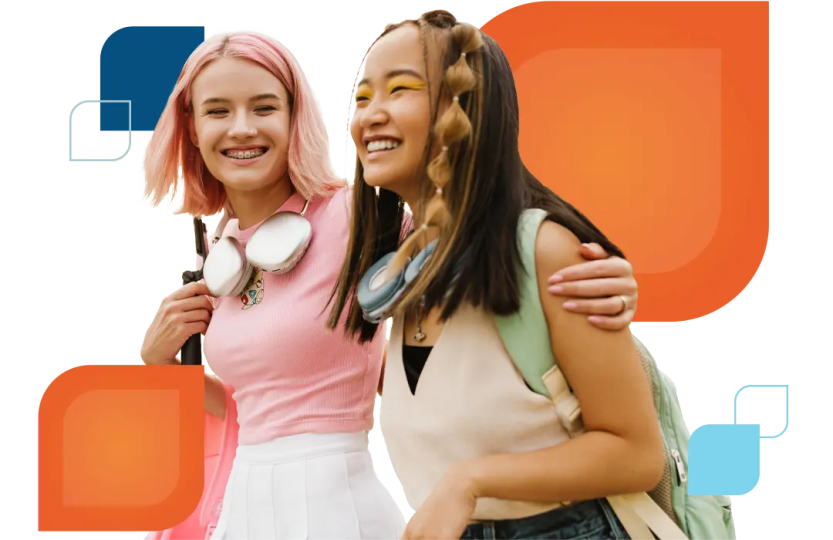Give Teens a Role in Better Mental Health
Teach teens the confidence they need to start difficult conversations about mental health and substance use.

How teen Mental Health First Aid Helps
Many teens with mental health challenges feel alone, dealing with depression, anxiety or substance use in silence. With suicide now the second leading cause of death for young people, it’s time to equip teens to support each other. Our evidence-based training helps you build a peer support network that gives students hope and a way forward.

Change Their Perspective
Motivate teens to care for each other and promote belonging — making bullying and social isolation a thing of the past.

Break the Stigma
Most teens would rather open up to their friends than to a mental health professional. Help them understand it’s OK to not be OK, and how to create a safe space to talk.

Give Them the Vocab
It can be hard to talk about mental health, and most teens don’t know how. They’ll learn the signs and symptoms and how to talk to someone who needs them.

Motivate Them To Step In
In 2024 alone, 2.6M teens had thoughts of suicide. When a teen shows symptoms, their friends can be the first to offer help. Our MHFA Action Plan shows teens what to do before or during a peer’s crisis.

Teach Them When To Tell an Adult
Help teens know when to escalate their concerns to a parent, guardian or trusted adult they can trust to find resources and professional help.

Help Them Reach Their Potential
When schools create support systems for teens to care for their mental health, they’ll build the resilience they need to be their best — at school and in life.
How teen MHFA Works
Through our program, Instructors in schools and organizations across the country have trained over 150,000 teens. These are the steps to becoming a teen MHFA host site and increasing your impact on teen mental health.
teen MHFA can be used to meet state mental health or substance use education requirements. It can be taught as a standalone course or as part of a school health curriculum.
Step One
Apply to become a teen MHFA site. Watch our webinars to make sure your school or organization meets the requirements.
Once your site is approved, our team will work with you to schedule Instructor trainings for your Instructor candidates.
Step Two
Train a group of Instructors in your school or organization. The training is available in person or online, and Instructors are ready to teach in as little as 3 days.
Instructor candidates are encouraged to take Youth Mental Health First Aid, though it is not required.
→ Get Youth MHFA Training
Step Three
Hold info sessions and share resources with parents and guardians.
→ How MHFA Supports Parents
Step Four
Set up your Instructors to train teens in our interactive curriculum in six sessions (45 minutes each) or 3 sessions (90 minutes each). Your Instructors can teach in person or online, or they can choose to teach in a blended environment, which pairs student pre-work with live instruction.
Teens in grades 9-12, or ages 14-18, can participate.
Step Five
Watch your teens build a peer-led support network, leading to positive change.
teen MHFA Instructor Overview
teen MHFA Implementation and Administration Requirements
Become a teen MHFA Site
Schools, youth-serving organizations or their partners can apply to be a teen MHFA site. Before applying, please review the requirements webinar. The National Council for Mental Wellbeing’s team will help you determine whether teen MHFA is a good fit for you.
What Teens Learn
In this multi-session training, teens learn how to help each other through hard times. Topics include anxiety, depression, eating disorders, bullying, social media, substance use and ADHD. They’ll be able to:
- Recognize signs and symptoms of mental health and substance use challenges.
- Understand the impact of violence and bullying on mental health.
- Use the MHFA Action Plan.
- Connect a peer with a parent, guardian or trusted adult.
- Address stigma and explain that recovery is possible.
- Practice self-care and give tips to their friends.
How MHFA Works with Schools
We know parents and guardians want to understand the ways schools and organizations care for their child’s mental wellbeing. If you plan to teach teen MHFA, keep parents and guardians informed before the course starts.
As part of implementing teen MHFA, schools and organizations host info sessions and provide resources for parents and guardians. They’ll have a chance to hear about the curriculum, to ask questions and raise concerns, and to learn new ways to support their child’s mental health.
All parents and guardians can opt their child out of teen MHFA.
Critically, teen MHFA teaches teens to reach out to a parent, guardian or trusted adult. For this reason, schools and organizations provide Youth Mental Health First Aid training — our course for adults who work or live with youth — for at least 5% of their teen MHFA Instructors. We encourage parents and guardians to attend a Youth MHFA course as well, to create opportunities for increased trust and shared understanding with their teens.
Are you a parent, guardian or teen looking to bring MHFA to your community? Make the case for teen MHFA to your school with our resources:
- teen MHFA One-page Overview: Facts, figures and details about teen MHFA.
- teen MHFA Brochure: Tips and resources to help you bring teen MHFA to your school or youth-serving organization.
- teen MHFA FAQs: Answers to frequently asked questions about teen MHFA.
Have Questions?
We’re here to help you bring the right mental health training to your school or youth program. Let’s talk about how we can support teens in your community.
